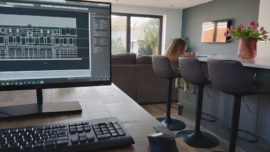
Having building work done can be a little bit daunting if you’re not confident in managing projects. There’s a lot at stake, after all, putting your faith entirely into someone you’ve probably never even met, responsible for thousands of pounds worth of work. It’s a lot to take in, but having an idea of what you can do before your building work starts can be a great way to minimise any risks and help the whole thing go a lot more smoothly.
Whether you’re having a minor home renovation or getting a complete new build project, the same elements apply to managing any project. There are a few things you should always do no matter what work is being carried out to make sure you and your builder on the same page, protected, and ready for whatever lies ahead.
1. Check the Legalities
The most important thing to keep in mind when you’re having any work done, no matter what, is that everything should be above board. Legally speaking, there are lot of different factors involved in getting work done. All of it is essential and can really make your life easier, especially when it comes to selling your property later down the line.
Some of the most important legal documents that you should really have covered are:
- Building Regulations Approval
- Planning Permission (or Permitted Development Rights)
- Certificate of Lawful Development
- Listed Building Consent (where needed)
These are all essential for a proper project that is completely up to standard in the UK.
2. Contracts and Insurance
Another big consideration when it comes to having building work done is the contracts and insurance involved with the project. It’s important to make sure that there is a contractual agreement between your and your building in case of any issues and to make sure that everything is clearly outlined that needs to be discussed. That covers most of the things we’ll talk about here, but it should all be confirmed in writing.
Make sure you also factor in any relevant insurance into this part of the building work preparation as well. The builder should be insured, and you should also check any insurance requirements that you may have too. Check with your home insurance provider for example that everything is above board both before, during and after the build in case anything should happen for any reason.
3. Payment Terms
It’s always a very smart move to have your payment terms outlined clearly as well as any other agreement. Get a confirmed quote for the work that is to be done, what is to be expected, and when the payment is likely to take place too. This is essential to prevent any negatives down the line and for qualk8ity control and contractual assurance.
It’s not a wise decision to pay everything up front in case the builder doesn’t fulfil their contracts, so releasing the money throughout the project is often the most advised move. It’s also smart to not release the final payment until all of the work is complete to the standard you’re happy with and agreed upon. This is where your contract comes back into play too.
4. Schedule of Works
A schedule of works is something that can be a huge benefit to you, both financially and conveniently. Knowing what to expect and when you can expect it helps to show you exactly what you’ll be paying for, but also when you may need to take extra action in order to maintain a strong quality of life.
You might want to seek accommodation elsewhere while the kitchen or bathroom is underway, for example, or perhaps want to ensure you know when your property will be ready to move into. Whatever the reason, this accurate and agreed-upon schedule of works can be a big help to both of you.
5. Exclusion Zones
On a similar train of thought, exclusion zones can also be a very wise decision when you’re preparing for building work as well. Exclusion zones mean that you know where you’ll be able to reply on when work is being done, where you can feel safer and most comfortable, and to keep boundaries between you and the work that’s being done if need be, too.
Do remember though that the work that needs to be done will need to be done, no matter what the zones are. You may need to adapt of move your exclusion zones as the work is being carried out. Being obstructive may simply delay your build and end up costing you more money as a result.
6. Facility Access
Finally, remember that you will be best off if you provide the right facility access to your workers. Agree with them what that should be, and get an understanding of what the cost implications of that might be too for your budget. It makes a big difference if the work will be down over months.
For example, access to water, heat, light and electricity if at all required may end up costing you a lot more on your utility bills that you first think. Add to the fact that they may need access to your facilities like lavatories or kitchens and you could have issues with any of the points above too. It’s your home after all. You need to know what to expect.
Summary
Overall, the best thing to remember is that you should be prepared for the work that is about to happen, both mentally and formally. It helps to have anything that might be a factor anywhere during the project in writing. Having a contract and agreed expectations helps both parties to have comfortable and efficient build experience and get the whole thing done to the bets standard possible.
Remember that project management services are always available to you, too. That means you can have experienced construction or architectural staff managing all of this for you rather than having the stress yourself, and it may only cost a fraction more of the build cost.
Whatever you decide to do, remember that communication and preparation are key. The rest should take care of itself.





